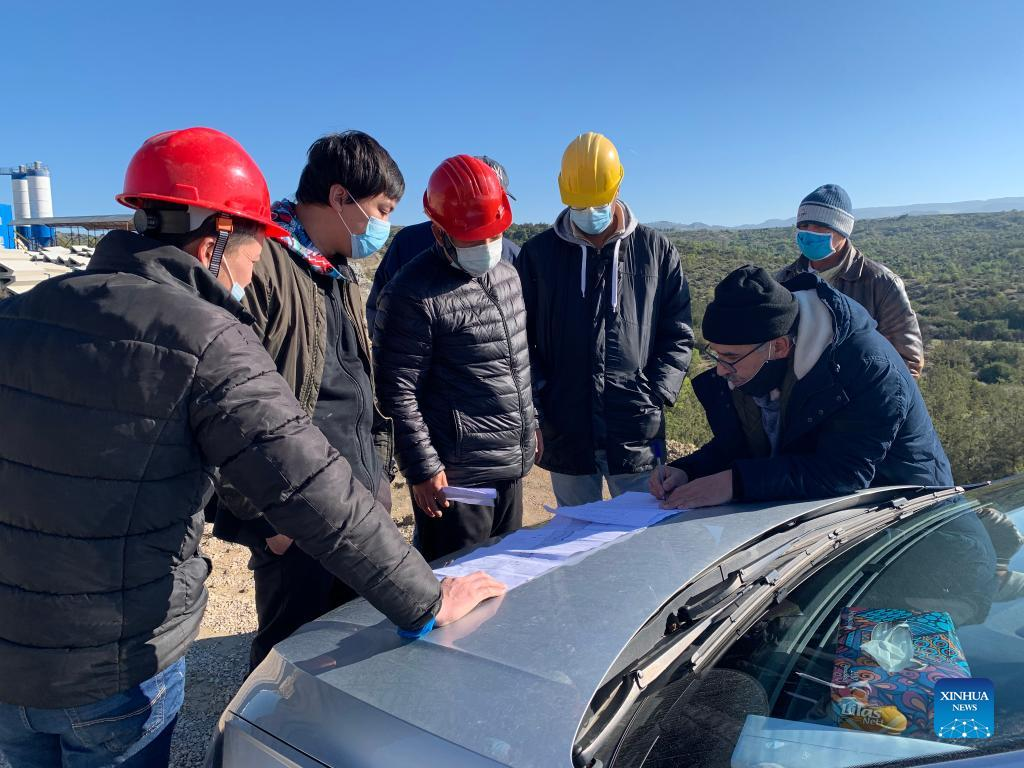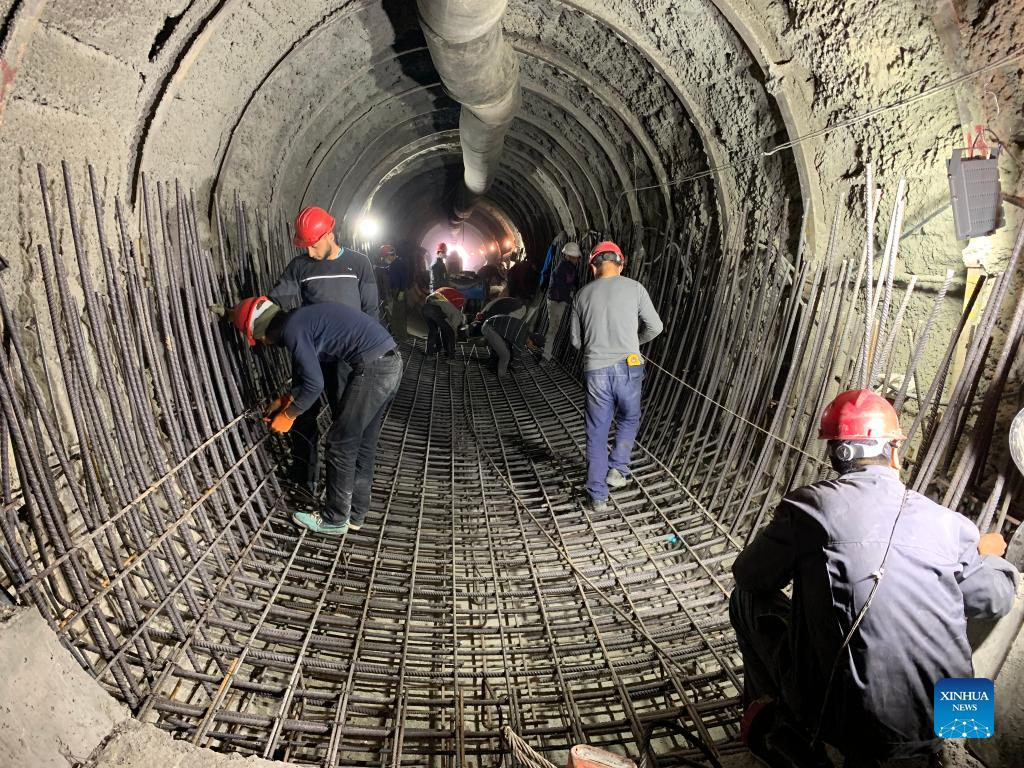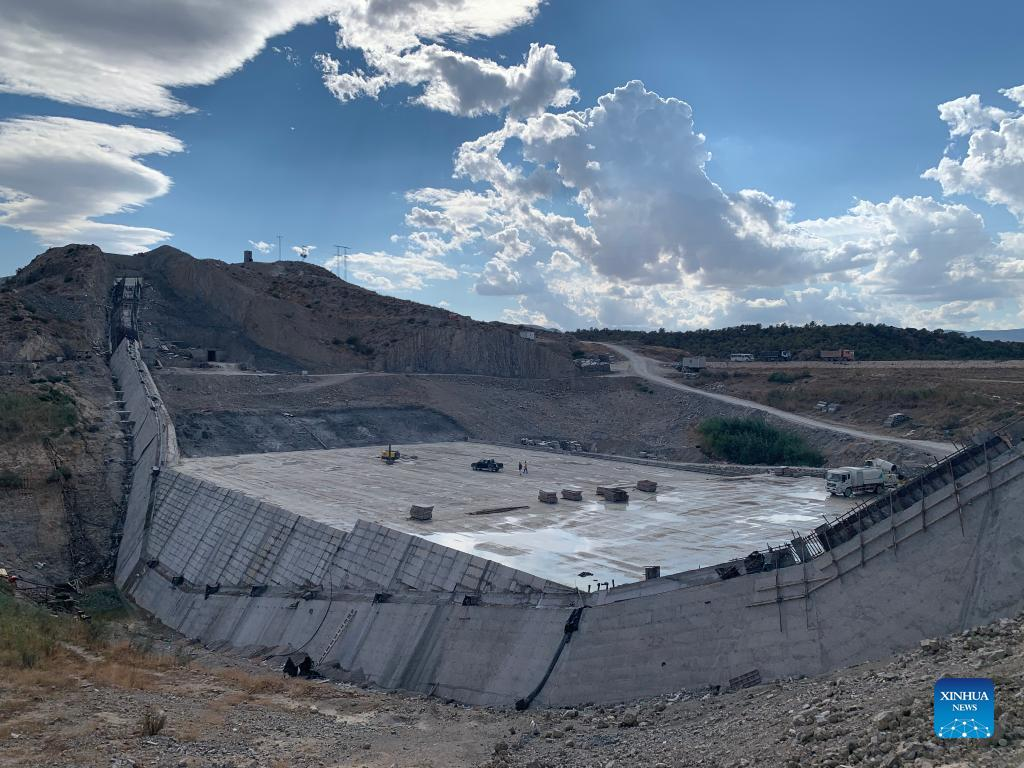
Engineers from China and Tunisia discuss the construction scheme at the construction site of the Mellegue dam in Tunisia's northwestern province of El Kef, on Jan. 20, 2021. In May 2016, China's power construction company Sinohydro won the bid to build a new dam over the river to replace the run-down old one. The Mellegua dam is scheduled for completion in September 2023. With a maximum capacity of 305 million cubic meters of water, it will play a significant role in protecting the ecological environment in Tunisia. (Sinohydro/Handout via Xinhua)
by Xinhua writers Huang Ling, Xu Supei
TUNIS, Aug. 24 (Xinhua) -- In the valley of the Mellegue River, a perennial river passing through Tunisia's northwestern province of El Kef, a Chinese engineering team is busy building a giant dam, which, once completed, will become one of the largest water conservancy facilities in the North African country.
In May 2016, China's power construction company Sinohydro won the bid to build a new dam over the river to replace the run-down old one.
"Compared with the previous one, the new Mellegue dam is smaller in size and does far less damage to the environment," Qiu Yusheng, chief engineer of the project, told Xinhua.
The Mellegua dam is scheduled for completion in September 2023. With a maximum capacity of 305 million cubic meters of water, it will play a significant role in protecting the ecological environment in Tunisia.
At the entrance to the namesake capital city of El Kef stands a gigantic sculpture of wheat, which symbolizes the contribution of the agricultural province to the country. However, the unemployment rate in the breadbasket province has risen sharply amid the economic downturn in the recent years.
"The Mellegue dam is not only the largest water conservancy project under construction in Tunisia, but also a magnet for local workers," the project manager Lu Mingjun told Xinhua.
At present, nearly 300 Tunisians have been employed to work on the project, which has partly relieved the employment pressure in the province.
Alis has been working for the dam project during the past five years. Every day, the Tunisian man has to hitch a ride to work from his home dozens of kilometers away. However, he has no hard feelings because "the job allows me to support my family."
"The Chinese colleagues are so kind to us. I'm very happy to work here," he said.
Westani Wassim, a 36-year-old laboratory operator, said the Chinese colleagues taught them to operate the experimental equipment, which has improved their labor skills and competitiveness in employment.
"The job also brought us a stable income," Wassim said, adding he and his colleagues are now sought-after infrastructure talents in his hometown.
According to a recent report from the World Resources Institute, Tunisia ranked 30th among countries facing a high level of water stress. The Tunisian government has paid great attention to water conservancy projects, especially the building of the Mellegue dam.
During his visit to the Mellegue dam in December 2019, Mokhtar Nefzi, governor of El Kef, expressed his appreciation to the Chinese side for its long-term efforts in building the dam.
Nefzi hoped that Sinohydro would continue to make full use of its own advantages to help facilitate the local agricultural production.
In May, Faiz Msallen, head of the dam department at the Tunisian Ministry of Agriculture, expressed satisfaction with the overall progress and paid tribute to all workers for their commitment despite the COVID-19 pandemic and extreme weather.
"We are determined to make the dam a firm monument that will stand in the valley for the next century," said Wang Chenrui, a Chinese employee who has worked on the project for three years. ■

Photo taken on Feb. 15, 2021 shows the construction site of the Mellegue dam in Tunisia's northwestern province of El Kef. In May 2016, China's power construction company Sinohydro won the bid to build a new dam over the river to replace the run-down old one. The Mellegua dam is scheduled for completion in September 2023. With a maximum capacity of 305 million cubic meters of water, it will play a significant role in protecting the ecological environment in Tunisia. (Sinohydro/Handout via Xinhua)

Photo taken on Aug. 22, 2022 shows the construction site of the Mellegue dam in Tunisia's northwestern province of El Kef. In May 2016, China's power construction company Sinohydro won the bid to build a new dam over the river to replace the run-down old one. The Mellegua dam is scheduled for completion in September 2023. With a maximum capacity of 305 million cubic meters of water, it will play a significant role in protecting the ecological environment in Tunisia. (Sinohydro/Handout via Xinhua)
